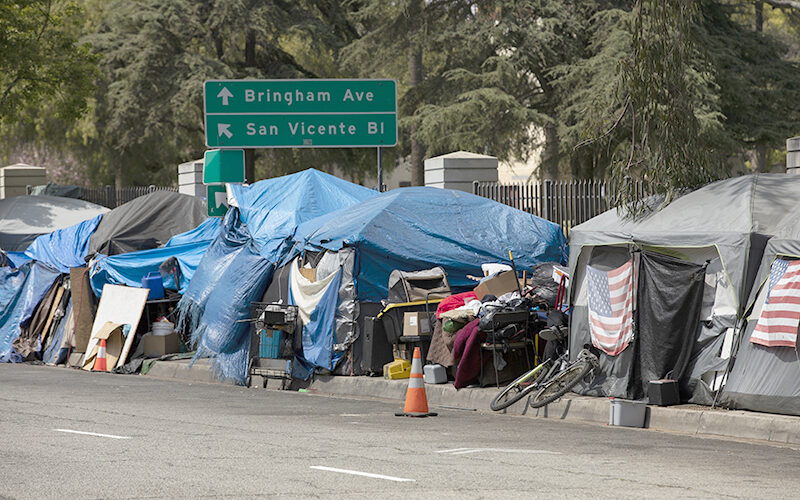
A homeless encampment in Downtown Los Angeles. Photo: Matt Gush
The homelessness crisis is one of the biggest issues facing California. To understand the human toll of housing insecurity and to assess the efficacy of government response, we depend on journalists to sort fact from fiction. And to bear witness when governments take action.
That is especially true when it comes to sweeps of homeless encampments. Following a recent U.S. Supreme Court ruling giving government broad powers to evict homeless people and clear their belongings, and California Gov. Gavin Newsom’s subsequent call to action, officials across the state are cracking down on the camps set up on our streets, sidewalks, parks, and parking lots.
From Santa Cruz to Silicon Valley, officials are dismantling camps and passing new laws. Berkeley is considering an “aggressive approach.” Fresno has passed an anti-camping ordinance that critics call criminalizing homelessness.
Whether you view these sweeps as appropriate abatement or devastating and dehumanizing, it’s difficult to assess without a free and independent press documenting it for the record. We depend on journalists to cover these important stories about our communities.
But reporters and photographers in the field are facing unacceptable obstacles. When the Sacramento Bee’s Renée C. Byer and Theresa Clift covered a sweep of a large encampment, they encountered police tape cordoning off an entire city block and the threat of arrest. “I can’t get back those missed vital images of the police storming the gate from the area I should have been allowed access and was told I had to leave earlier that morning,” Byer said in an article in the Bee.
Los Angeles journalist Lexis-Olivier Ray was among those covering sanitation workers’ cleanup of camps when he encountered LAPD officers who said he wasn’t allowed in “a secure work zone” and was threatened with arrest. “You are going to arrest me for documenting a sanitation cleanup from a sidewalk?” Ray says to an officer. “I can safely report from here” he tells another city worker, before ultimately retreating farther away.
The reasons we’ve seen authorities give for obstructing journalists’ access are unfounded. And, understandably, fears of arrest and injury in these tense moments are not overblown: The 2021 debacle at LA’s Echo Park — when a large protest broke at at a sweep and police detained and injured journalists — looms large.
We’re calling on California leaders and local law enforcement to do better. We led a coalition of 23 press and civil liberties organizations in an open letter reminding government officials that the First Amendment guarantees the right to observe and record their actions in public, from reasonable distances. We’re urging officials to respect the role of the press as the eyes and ears of the public in these moments. Journalists must be allowed to do their jobs while city workers do theirs.
You can read our full letter here.
Thank you for your interest in our work.
Ginny LaRoe
Advocacy Director
